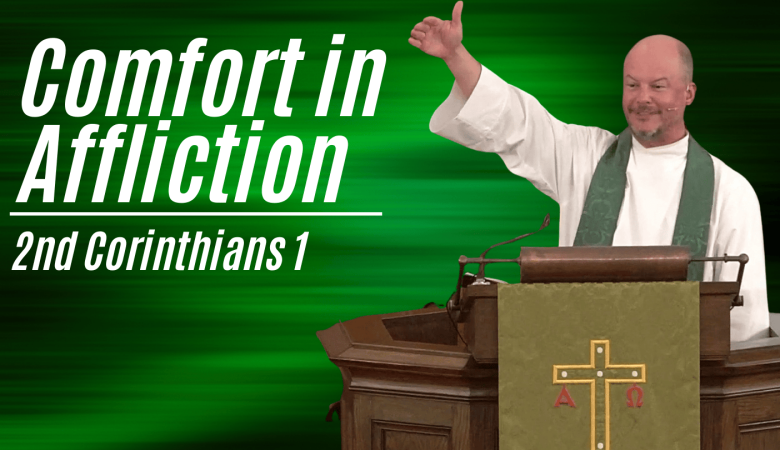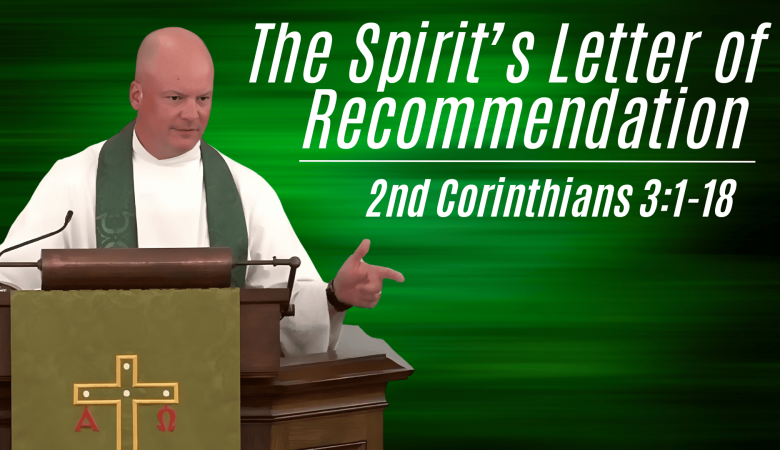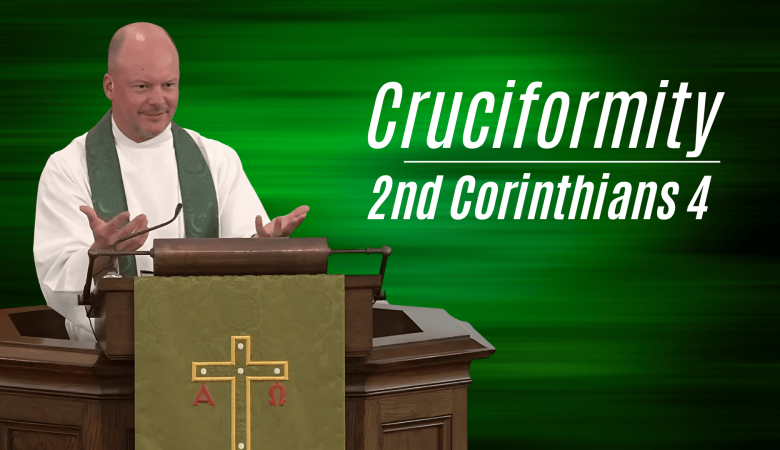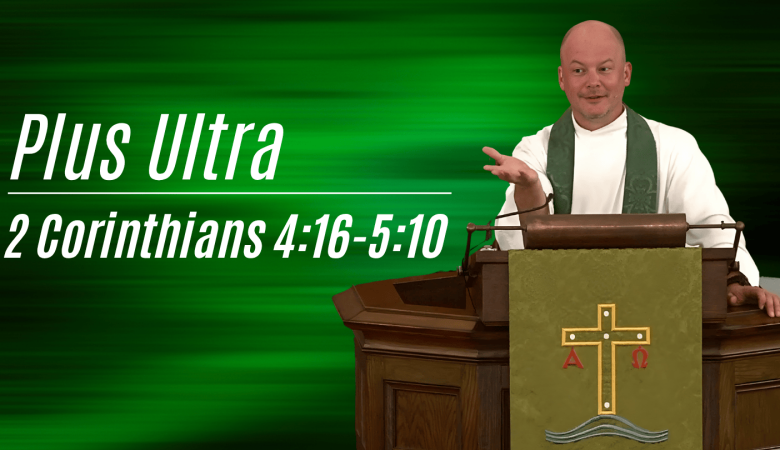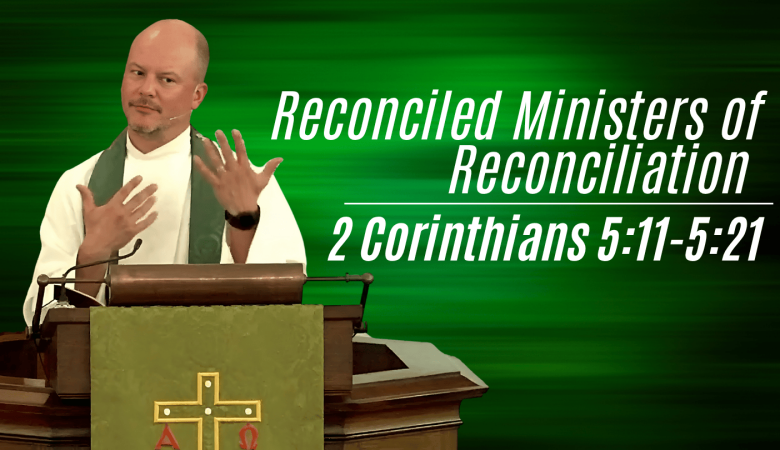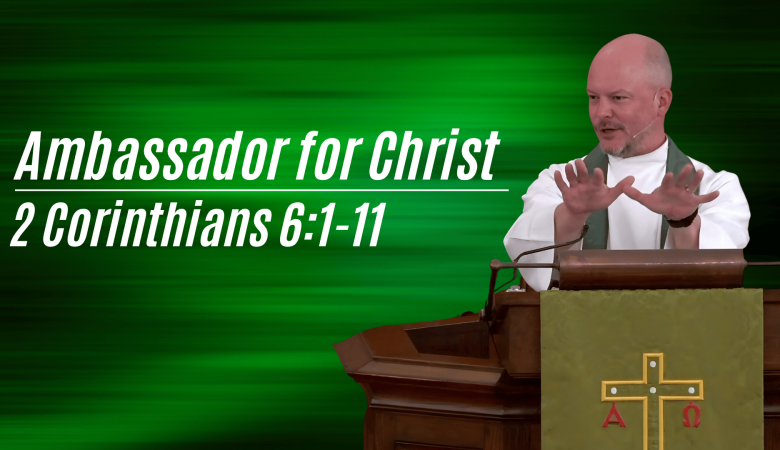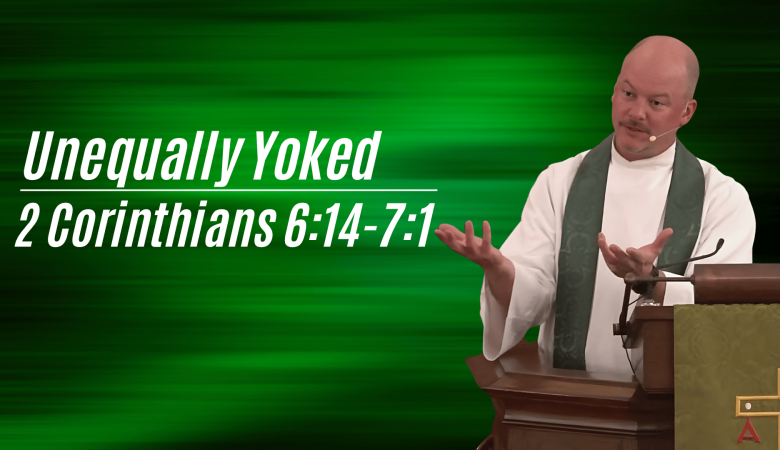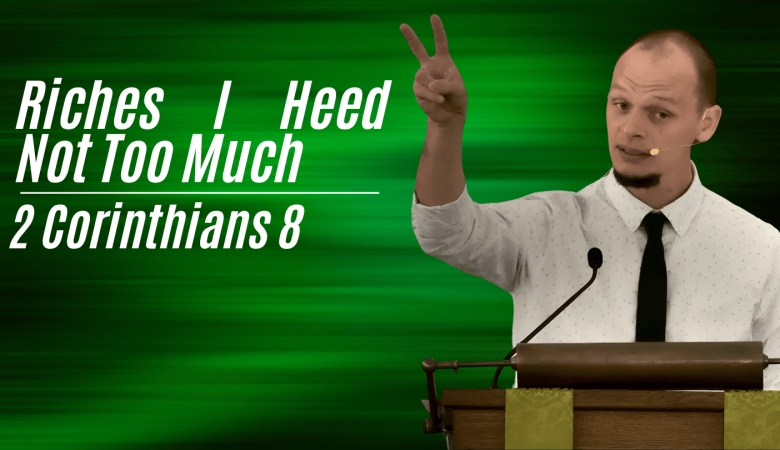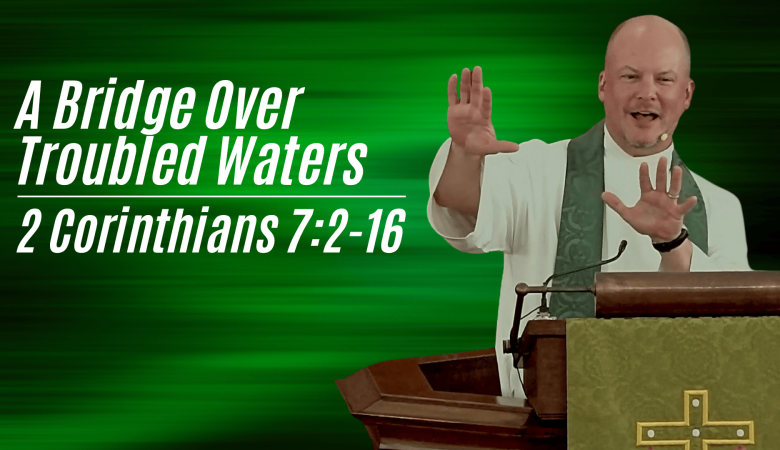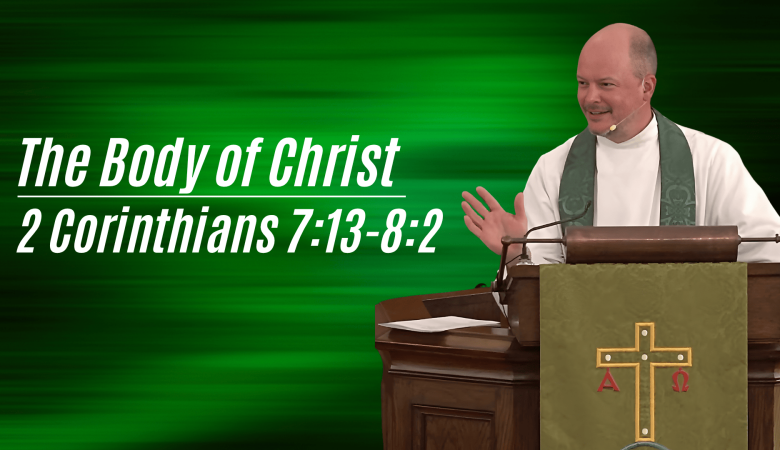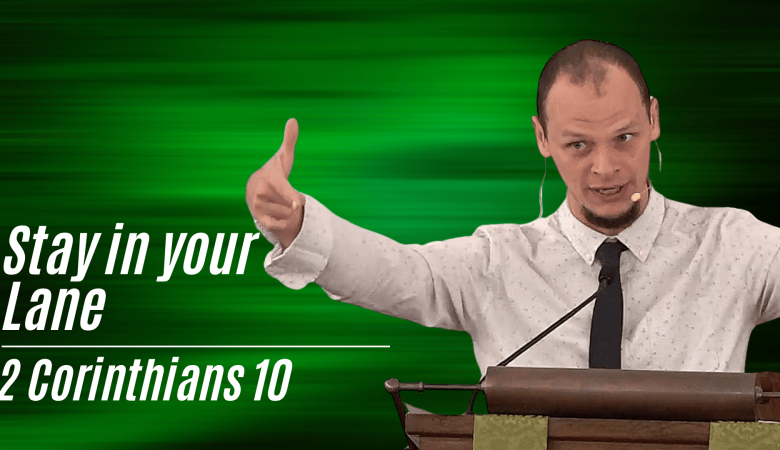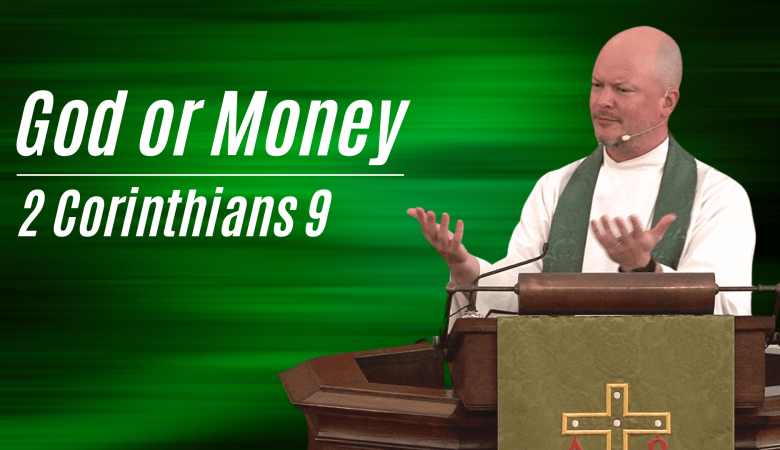Series: Power in Weakness
The Aroma of Forgiveness
September 07, 2025 | Peter Rowan
Passage: 2 Corinthians 2:5-17
Summary
Jesus command his followers to forgive one another making forgiveness an essential Christian practice. Through Paul's teaching in 2 Corinthians 2:5-11, we discover that forgiveness is not optional but a clear command from Jesus himself. Paul is clear, unforgiveness damages not just individuals but entire communities, while forgiveness brings healing and comfort to all involved. When we forgive Paul's tells us we bring 'aroma of Christ' before His Father - linking our forgiveness to both Christ's resurrection victory and His sacrificial atonement.
Transcript
Opening Prayer
Lord, this morning, as we turn to this second chapter of Second Corinthians and come to the great subject of forgiveness. And as we hear, as we just heard this powerful parable from your mouth, Lord Jesus, pray that we might live into the reality of what you have done for us and that we might image you in our life with others. Write these holy words on our hearts and would they shape our lives. Amen.
Introduction: The Story of Corrie ten Boom
Some of you, maybe many of you, know the remarkable story of Corrie ten Boone. She was born in Amsterdam in 1892. She was born to a devout. A devout Christian family. Her parents raised her in the knowledge of the Lord. At least we have a sense of early on in her life, around the age of five, some of you are close to that age, she had a living and active faith in Jesus.
Well, her dad actually inherited the family watch shop in Harlem, and they moved there, which you may know nearby to Amsterdam. And remarkably, at the age of 20, she became not only the first woman who was licensed as a watchmaker, but also the youngest one. At 20 years old, she was working there alongside her dad in their watch shop. She had two older siblings who were married, she and her sister Betsy, they never married. They lived their life with their parents, and they were very active in evangelism and in caring for those in need. They actually started a club for younger folk with different disabilities, sharing the good news of Jesus with them and giving them fellowship with one another and joy in their life. And a remarkable, remarkable woman.
Corrie's Resistance Work and Arrest
When the Nazis invaded the Netherlands in 1940, she began cycling around as they do over there. My sister is actually a missionary in the Netherlands. They ride their bikes all over the place, and she would cycle to these different resistance meetings. And she actually gathered ration books during the war, specifically for the Jews that were not given ration books for their food. She organized. She helped organize long term places of hiding for those Jews who were seeking refuge. And you may know the story, but there was actually a hiding place for these Jews right off of her own room, her own small bedroom.
Well, on the 28th of February, in 1944, this Dutch resistance movement that was hiding Jews was betrayed. And Corrie ten Boone was actually not feeling well and was sort of caught off guard when Jews rushed into her room and into the hiding place. And she and her entire family and the Jews there with her were arrested and caught and she was taken to prison. Actually, interestingly, she was put in confinement because it was believed that she was one of the great underground resistance leaders. She later confessed and expressed just how unbelievably difficult solitary confinement was.
Life in Ravensbrook Concentration Camp
But she was reunited with her sister Betsy, and they were taken off to Ravensbrook, which was the concentration camp where so many women went. Actually, read, it's estimated that 35 women would be there at that. Sorry, 35,000 women would be at that camp at any given time. 35,000. They were brought there. They were stripped naked. They were placed in housing situations where there were hundreds and hundreds in a little barracks housing. Lice infected the mattresses which they shared with one another. It was an awful, awful situation. They would rise for roll call at 4am they were forced to work long days. They were watched over. They were berated. They were beaten by the guards. And, of course, the smell of dead bodies permeated those concentration camps.
Betsy, her sister, died there at Ravensbruck on 16 December. And Corrie was released actually on 31 December, just a few weeks after her sister's passing. But it was determined that it was a clerical error, because just a few weeks later, every woman her age was killed in that camp. Remarkably, her life was spared.
Betsy's Final Words
But I read this, that just before her sister Betsy died, she told Corrie, when we are set free from this terrible place, and we will be freed, Corrie, before the New Year, we must go over the world and tell everyone who will listen what we have proved to be true in this terrible place. That the love of God is stronger than the deepest darkness.
I wonder if you believe that. That in a place like that we have been so incredibly sinned against. The love of God is deeper, stronger than the deepest darkness.
The Reality of Being Sinned Against
Here's something that's true. Some of you have been hurt unbelievably, deeply, beyond what you ever imagined. Never thought you could be hurt this much. Some of you have been betrayed. Others of you have been abused. And some of you been mocked. Others of you have probably experienced the pain of adultery and betrayal. And the fact is that every single one of you have been sinned against. We are sinners. We confess. This. This is true. And yet every single one of us have been sinned against.
And Jesus tells us that if we do not forgive others, we will not be forgiven. Somehow we have to believe that the love of God is even stronger than the deepest darkness.
The Connection to Our Text
I said last week that at the heart of 2 Corinthians is the truth that power is made perfect in weakness. And I think that one of the places in our lives where this truth is most known, or it can be most powerful because it is so hard, is in our acts of forgiveness. The things that we have to forgive.
So I want you to open up your Bible. Okay? If you do not have a Bible open, I want you to open it up to 2 Corinthians, chapter 2. We're starting there in verse 5. We went through verse 4 last week. We're going to finish this chapter. And what we're going to do is we're going to look at a few things. We're going to see a number of important things that come up when we come to the subject of forgiveness. Okay?
First Point: Forgiveness is a Command
Looking at the idea of forgiveness, Second Corinthians 2, 5, we look at that first paragraph. There's a few things that you see sort of immediately. And one of the things that I want you to see first is sort of what I've just said is that there is a command to forgive. The command to forgive, verse seven says, rather, turn to forgive and comfort him. Verse eight says, so I beg you to reaffirm your love for him by this act of forgiveness. Verse 9 says, this is why I wrote you, that I might test you and know whether you are obedient in everything, which is in the context of forgiveness. Are you hearing what I'm saying? Do you understand the command to forgive? Certainly. This paragraph is speaking of this command to forgive.
And that command can be seen all throughout the Bible. But actually there is no one who says it more clearly and more starkly and maybe even more sort of stronger than we want than our Lord Jesus himself. Matthew, chapter 6, verses 14 and 15. For if you forgive others their trespasses, your heavenly Father will also forgive you. But if you do not forgive others their trespasses, neither will your Father forgive your trespasses. The unbelievably strong command of our Lord Jesus to move towards forgiveness.
The Parable of the Unforgiving Servant
Think of the the parable that was just read for us From Matthew, chapter 18, the great parable of the unforgiving servant. He was forgiven so much. And he came out from that being, just forgiven so much. And he demanded somebody else pay him back. And I want you to hear again how Jesus ends that parable. Then his Master summoned him and said to him, you wicked servant, I forgave you all that debt because you pleaded with me. And should not you have had mercy on your fellow servants as I had mercy on you? And in anger, His Master delivered him to the jailers until he should pay all his debts. So also my Heavenly Father will do to every one of you if you do not forgive your brother. It doesn't just say with your words from your heart a difficult Thing.
But it is very clear in our passage in 2 Corinthians, very clear from the words of our Lord himself, the mouth of our Lord, that there is a command to forgive. The command is clear.
Second Point: Forgiveness is a Challenge
But one of the reasons why maybe right now for you this is sitting a little hard is because we also know forgiveness is an unbelievable challenge, is not easy. And this is also brought up in this paragraph. Actually, it's a challenge, first of all, because actually some of the. I mean, if you are actually going to forgive, you have to acknowledge how deeply you were hurt. You actually have to face the pain of the sin that was done against you. We can be hurt so deeply, we've been sinned against so intensely, it affects us so incredibly, affects all of us.
Verse 5, Paul says that the pain that one has caused wasn't just to him, but it was to the community at large, right? Wasn't just against him. It's affecting everybody, which is, say your sin, the ways that you've been sinned against, isn't actually just something that touches you, but it touches your community. That's one of the reasons why forgiveness is so deeply hard.
The Communal Nature of Sin and Forgiveness
Here's another thing, though, on the flip side, in a way, your faithfulness to our Lord also doesn't just affect you, but it affects those around you. Say that the Bible assumes a communal life that is so much deeper and so much richer than we imagine, than we have minds to comprehend. It assumes that our lives are intertwined, that when one is sinned against, the whole community is affected. When one forgives, the whole community finds life.
Brothers and sisters, when you hurt another, you hurt us all. When you harbor bitterness against another, we are all a little worse off because of it. All Sin separates at distances. It breaks. And when one of us is distant because of sin, sure, there's like practical things like, oh, you're not present in worship or in small groups or jumping into volunteer in different ways, like English language classes, stuff like that. But when you are withdrawn, when you're emotionally withdrawn, when you're distant, it actually affects the entire body. That's what the Bible tells us. All of us are affected by sin. All of us are affected by unforgiveness.
We are not what and who we should be as individuals and as a community, when we are sinned against and we are not what and who we should be as a community, when we harbor unforgiveness. Part of why forgiveness is such a challenge is because sin is so real and the effects of it are so deep.
Paul's Recognition of the Challenge
Did you notice? I Read this. And my first point there of the command. But Paul has to beg them to forgive, which is he is. He assumes that it's a challenge. He assumes this is not an easy thing to do. But he also says he has to beg. He. He has to beg them. And he acknowledges that Satan wants to outwit them. It's a challenge because it's hard to do, but also because Satan actually doesn't want you to do it. That's one of the things that he's acknowledging there. What he's saying is that forgiveness is a great challenge. It's a command, but it's not some easy thing that we should sort of brush off. Yeah, I forgive you. You actually have to look at the pain of what happened to you to enter into that. And you have to acknowledge there has to be a death of my power grabbing of my saying, I must be right and you must pay.
Forgiveness is a great challenge.
The Liberation of Forgiveness
Paul demonstrates here that forgiveness can be incredibly liberating. Maybe you notice this in verse 10. It's kind of wild. He says, anyone whom you forgive, I also forgive. Indeed, what I have forgiven, if I've forgiven anything, has been for your sake. Commentator sake. Paul is actually demonstrating that there is the possibility of genuinely forgiving and forgetting. Paul's like, I'm not even sure I completely remember everything, if I've forgiven everything. Meaning that he's been so liberated from grabbing on. He's demonstrating that forgiveness is deep, deeply liberating. But he is not ever denying that. It is not challenging, is calling us to something. It's the great command of our Lord. But he is admitting the difficulty of it.
C.S. Lewis's Story
And C.S. lewis was a little boy. He was nine years old, the age of my son James, nine years old. That was the year when his mother died. And maybe some of you know this. He was sent off to a boarding school in England. And he writes about this quite a bit. But the headmaster of that boarding school is actually a pretty sadistic kind of guy. And it seems as though he loved to cane the little boys there at the school to punish them severely. He was a very evil man. Meaning he would whip the boys with a cane when they were in trouble.
Warren, he went by Warney. C.S. lewis, brother, he went to the same school. And he wrote this. I have seen him, this headmaster, lift a boy of 12 or so from the floor by the back of his collar. And holding him at arm's length as one might a dog apply his canes to his calf. I mean, the ways that we have been sinned against are so deep. You might not have that story, but I guarantee you have a story. We live in a world that is infected by sin, and we can share our stories of how unbelievably difficult it is to offer forgiveness.
This was a miserable school. Like I said, Lewis writes about a number of times, and it was a time that sort of marked his life as one of the worst times of his life. He'd already suffered the loss of his mother. He's sent off by his father to this horrible, horrible place. And it was only shortly before his death in 1963, a half a century later, that Lewis could write that he had finally been able to forgive that man of the scars that he had put in his life.
Forgiveness is a command of our Lord, but it is also deeply, deeply challenging. It's a clear command, but it is a hard one.
The Context of Church Discipline
Here's the thing, okay, so second Corinthians 2 here. Almost everybody that you read believes that what he's addressing is actually one of the sins that was being addressed in First Corinthians, specifically in First Corinthians chapter 5, where there was a man who was having inappropriate relationships with his father's wife. And what happens in that context in First Corinthians chapter 5, if you know it, Paul says, have nothing to do with him. Discipline him in such a way that you sent him out from the community. Paul is so adamant that sin can actually affect the life of the community that you must deal with it. It's got to be dealt with. And there are some sins where you say, if you are persistent in this, you must actually be. Well, the term is excommunicated, but you have to be actually shunned from the community.
And almost everybody believes that's what Paul is addressing here in this paragraph. This man who has sinned so grievously and it's infecting the life of the community so intensely that this man actually must be taken out from the community. One of the things that we're seeing here, though, is that this discipline, this severe discipline for sin, has actually been met with a tender heart and a receptivity, very likely from this man. And Paul says, as. As much as you might want to continue to shun him, that is not the way of the Christian. You must. Must actually receive him back. You must actually embrace him, because again, the community's life is bound up together. What happens to one affects the rest. If one is sorrowful, a blight is cast on the whole community. If one lives in constant sin, it does affect the rest. And yet it seems as though, like I said, this disciplined works. And so Paul now says, if you don't forgive, it affects the whole body.
Part of the reason, again, why forgiveness is such a challenge in the Bible is because sin is taken so seriously, not brushed aside as nothing. It's taken so seriously that Paul says, actually this person must be outside the community. That's why forgiveness is so hard. It's such a challenge because it's such a serious thing. It affects us so much.
Third Point: Forgiveness is a Comfort
Forgiveness is a command. Forgiveness is a challenge. Let's say this though, thirdly, that forgiveness is a comfort. And here's another truth. In the absence of forgiveness and love, in the absence of those things, there is always bitterness and division. You do not grow in godliness when you harbor unforgiveness. Unforgiveness always invites bitterness and division. As another said, unforgiveness is the poison we drink hoping another will die. N.T. wright says, Forgiveness is a two way street. By releasing the other person from guilt, you release yourself from being crippled by their actions.
Forgiveness is a command. It's a challenge. It's also actually a great comfort.
Paul's Restlessness in Troas
We actually get a little glimpse into this. It's kind of interesting if you look down in your Bibles to the next little paragraph that begins in verse 12. Then there is verse 12 and 13. He says, When I came to Troas to preach the Gospel of Christ, even though a door was opened for me in the Lord, my spirit was not at rest because I did not find my brother Titus there. So I took leave of him and went on to Macedonia.
He's there in Troas. And Troas is sort of the upper eastern side of the Aegean Sea. Or if you can think of modern day Turkey, it would be like the very northwest. Be like looking at a map of the US It'd be in the Pacific Northwest. But a map of Turkey, well, it was a great city, a great port city. So you would often take a boat from there, a ship from there, and you would sail to other places. And one of the places where it would go would be the city of Corinth.
And so Paul goes to this city of Troas because he'd heard a door was open for him in the Gospel, which is sort of every missionary's dream, every pastor's dream. Oh, people that are receptive, they want to hear, they want to repent, they want to trust in Jesus. The door is wide open, sort of exactly what he probably longed for. And yet what does he say there? My Spirit was not at rest. My spirit was not at rest because Titus wasn't there. And why does that matter? Well, we'll actually. We'll get to this later, too. Titus was supposed to bring the news from the Church of Corinth. Had they lived into the reality of just how awful sin is, how it infects us, how it must be dealt with? And have they actually embraced the reality of forgiveness? What did the Corinthian Church do? Can they hold these things together? And Paul, he can't stay at Troas, even though the door is wide open, because he is not. He's not at rest.
Forgiveness Brings Healing and Comfort
Brothers, forgiveness heals. Forgiveness brings comfort. It brings comfort to the offended and to the offender, and it brings comfort to the communities that touch them. Parents. Parents. So many of you are parents. One of the greatest gifts you can give your children, I promise you, is living a life of repentance and forgiveness before them, with one another, with them. It is the fertile soil of life in your families, and it's the fertile soil for all of us. It's not a parental thing. This is the way the world works. You harbor unforgiveness. It will be bitterness and divisiveness that fester, that live.
Forgiveness brings comfort in the absence of love and forgiveness, that bitterness and division thrive. It's true here for Paul and the Corinthian community, for Titus. True for you. And it's true for me. It is. This is the way the world works. So forgiveness is a command. It's a challenge, it's a comfort.
Fourth Point: Forgiveness is the Aroma of Christ
But here's what I want to say. It's precisely because it is this command and it's this challenge and it's this comfort, that it is also the aroma of Christ, that it's the fragrance of the Good News. You know, forgiveness is this thing that can be smelled and lovely, that you wonder, how in the world, how in the world could somebody forgive? How could CS Lewis come to the end of his life and say, I've forgiven? How can you forgive somebody that treats somebody that way?
So if you look with me down at the next paragraph, the one that begins in 14, what you'll see is that in that verse, as we spread the fragrance of the knowledge. Let me read it. But thanks be to God, who in Christ always leads us in triumphal procession and through us spreads the fragrance of the knowledge of him everywhere. The next verse grabs onto this idea of the scent of the Good news also verse 15. For we are the aroma of Christ to God among those who are being saved. And among those who are perishing the fragrance, the aroma.
And here's an interesting thing, is that most commentators point out that there's sort of like two references that are being made in these words of smell, these smelling words. And I want to say that in a way, these two references point to the cross and to the resurrection, Christ's victory and his atonement.
The Victory Procession - Resurrection
But first, the resurrection. Okay, so verse 14 tells us that it says this, okay, but thanks be to God, when Christ always leads us in triumphal procession and through us spreads the fragrance of the knowledge of him everywhere. The ancient world would have been so familiar with this image, sort of lost on us a little bit. But it was a common practice in the ancient world to have a victory procession. This is very common in the Roman world, particularly in Corinth, was a Roman sort of colonial hub. So a military leader would come back from a battle, and if they were victorious, they would parade through the streets. And actually, oftentimes they would lead their captives behind them, but they would parade through the streets. And as they did this, what would often happen is throughout the city and throughout the streets, incense would be burnt. And so even if you weren't at the parade itself, you would smell it. You'd say, oh, something victorious. We were victorious. They conquered. There's a fragrance.
The greatest actually parade that we sort of have recorded, Josephus records this and other ancient historians, was actually the Emperor Titus, not the Titus that's mentioned here, the missionary, but Emperor titus in. In 71, in AD 71, when he actually took over Jerusalem. And the great Titus Arch, which still stands in Rome, that was considered the greatest victory procession in the Roman world. But what was what marked these processions was the sweet smell of victory.
The Challenge of Going Down to Forgive
And the Corinthian Church, we're going to get into this later on in other sermons. But the Corinthian Church was inclined to this kind of triumphalism, this sort of ease. You know, they wanted to have their ears tickled by the peddlers of the Word of God. But they often shunned humility. They shunned giving up of oneself, giving up our means, our finances, getting low, living into weakness. And something that's very true is that to forgive, you actually have to go down. And the Corinthians shunned that dynamic.
So one of the things that we're getting from this fragrance is that Christ conquers. He's leading us in victory. It's a resurrection kind of idea. And it's precisely because of the resurrection that you all have both Forgiveness and the power to forgive. As you know that going down is not the end of the story. Lift it up when you're humble. But that kind of victory, that kind of fragrance is empty without the cross. Okay?
The Sacrifice - The Cross
And so you first have this triumphal procession with this fragrance mentioned. And then verse 15 says, for we are the aroma of Christ. We're the aroma of Christ. And that word is a word that's used a lot in the Greek Old Testament. And almost always it is used as it is. Actually, you just heard that one verse from Numbers, chapter six, but it's used throughout Numbers in that chapter as the sweet aroma of the sacrifices that God's people offered in worship that would ascend up to the Lord. And he says it's a sweet aroma. The sacrifices are a sweet aroma, which is to say, we are the aroma of the sacrifice of Christ in our living into what Christ has done in forgiving us.
What he's done on the cross was to accomplish the great sacrifice for the atonement of sin. What he's done in that act of offering himself up as the sweet aroma of the sacrifice, forgive us. So this act on the cross was a necessity, which is to say, it was a command by the Father, right? The Father commands the Son. Jesus says, not my will, but yours be done. This act on the cross was a challenge. Paying for sin and forgiveness is not an easy thing ever. It demands the very death of the Son of God for us to be forgiven. And this act on the cross brought comfort and peace to our bitter and our divided world.
You see, these sweet smelling aromas are actually connecting us to this idea that it is a command, it is a challenge, and it brings comfort. Forgiveness is never easy. What these words of fragrance and aroma say is that they demand. Forgiveness always demands death, but forgiveness always brings life out of death. This is the way of the gospel. This is how we live into the Gospel.
The Necessity of Living from Forgiveness
This is why Jesus can actually say, if you do not forgive your brother, you will not be forgiven. Because if you taste the forgiveness of God, you know how difficult it was for our Lord to forgive us. Demands his very life, but how willingly he does so. We've got to live out of this reality of being forgiven.
Corrie ten Boom's Encounter with the Guard
Let me end with a portion of Corrie Ten Boone's wonderful book, the Hiding Place. Okay, I will end with this. She says this. It was at a church service in Munich that I saw him. The former SS man who had stood guard at the showers, the shower room door in the processing center at Ravensbrook. He was the first of Our actual jailers that I had seen since that time. And suddenly it was all there. The room full of mocking men, the heaps of clothing, Betsy's blanched face.
He came up to me as the church was emptying, beaming and bowing. How grateful I am for your message, Fraulein, he said. To think that, as you say, he has washed away my sin. His hand was thrust out to shake mine. And I, who had preached so often to the people of Bloemendal, the need to forgive, kept my hand at my side. Even as the angry, vengeful thoughts build, built through me, I saw the sin of them. Jesus Christ had died for this man. Was I going to ask for more?
Corrie's Struggle and Victory
Lord Jesus, I prayed, forgive me and help me to forgive him. I tried to smile. I struggled to raise my hand, and I could not. My guess is that you know that experience. I felt nothing, not the slightest spark of warmth or charity. And so again I breathed a silent prayer. Jesus, I cannot forgive him. Give me your forgiveness.
As I took his hand, the most incredible thing happened. From my shoulder, along my arm, and through my hand a current seems to pass from me to him, while into my heart sprang a love for this stranger that almost overwhelmed me.
Final Application
Brothers and sisters, I guarantee you that you hear the command of our Lord that you must forgive or you will not be forgiven. And you have ways that you have been so deeply sinned again that that challenge is way too much for you to bear. But our Lord is with you in it, and he promises you to bring comfort in the midst of it. And our Lord Jesus knows the challenge of forgiveness. He died. He's a man acquainted with grief, familiar with pain because he was sinned against by you and me. Yet he offers you his forgiveness and he calls you to live that life for others. It is the way of life and peace. It is the only way of life and peace. Without it, bitterness and division will grow and fester and with it, life and peace.
Closing Prayer
We pray. Lord, I pray that we would not be those who make light of sin. Brush it aside. That's nothing. And yet, Lord, I pray that we would be those who are eager to be like Paul here, who almost can't even remember what he forgave somebody for, though we know how much he was sinned against. How we think of how. You tell us it's as far as the east is from the west that you have removed our sins from us. You've forgiven us, though they meant your very death on the cross. It's as though they are utterly and completely as though they never happened.
God, I pray that we would be a community that can hold these truths. Don't brush aside pain. Brush aside the evil of the world. Brush aside the ways that we have been hurt. Cut deep. And yet, Lord, would we be a community that is running to forgiveness? Because running to forgiveness is running to the cross and to the empty tomb.
Holy Spirit, give us this strength. As Paul himself says, who is sufficient for these things? Amen.
Series Information
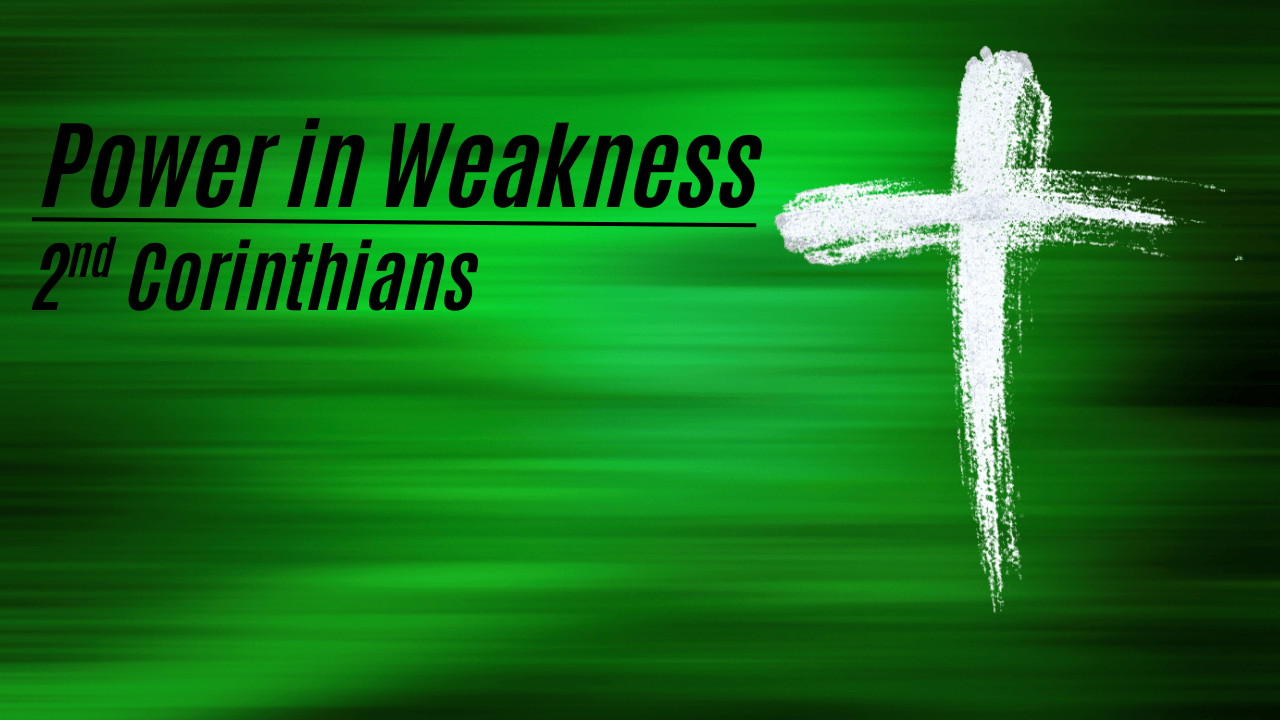
Second Corinthians is Paul’s defense of his love for and love toward the church in Corinth. Paul’s defends his apostolic ministry against critics who question his authority. He recounts profound suffering—beatings, imprisonment, near-death experiences—yet refuses to boast except in his weaknesses. Through personal vulnerability, Paul reveals Christ's power working most effectively in human frailty. He describes his mysterious "thorn in the flesh," where God's response becomes the letter's centerpiece: "My grace is sufficient for you, for my power is made perfect in weakness." Paul embraces this paradox, demonstrating that divine strength flows through broken vessels. His authenticity and struggles validate rather than undermine his ministry, proving that God's power shines brightest through human limitation and dependence.

